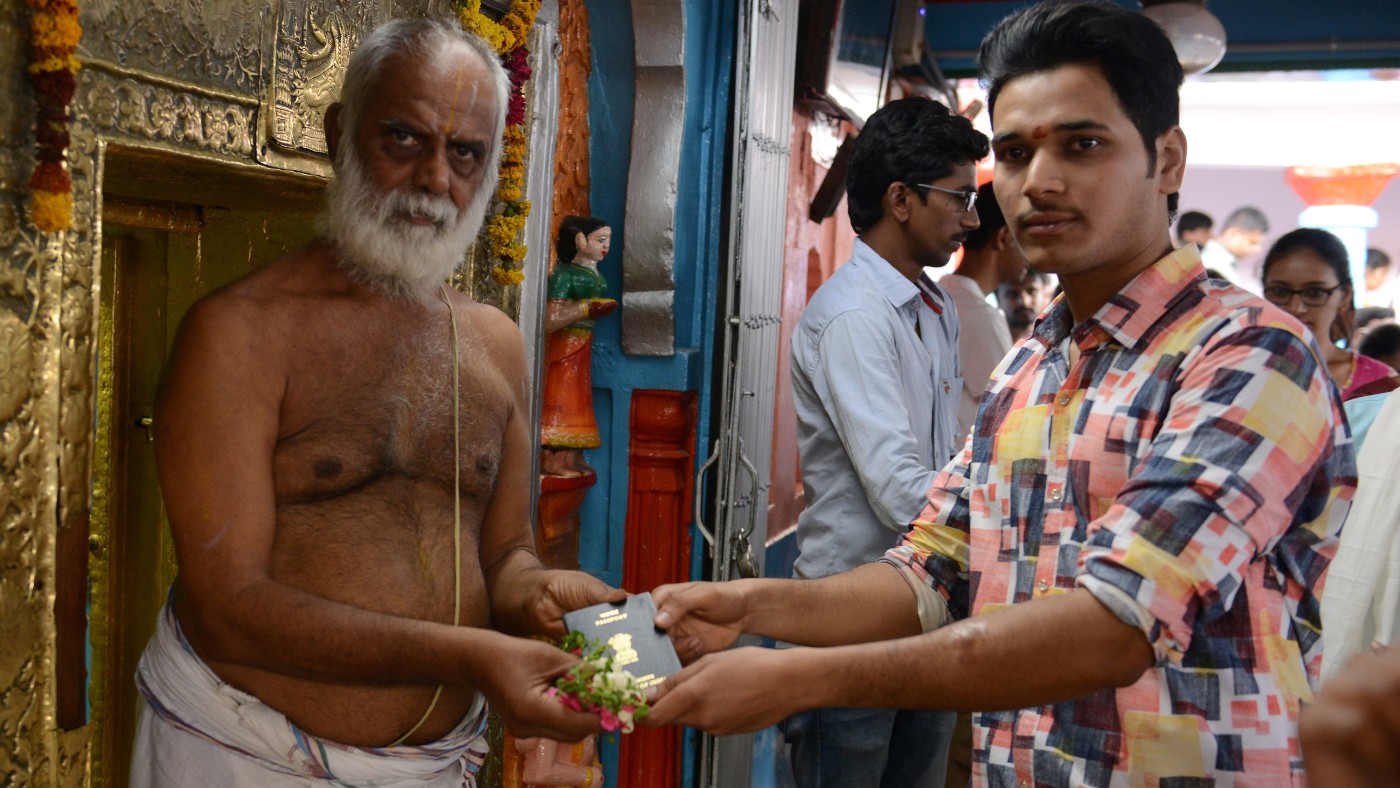India's visa temples offer divine intervention to hopeful migrants
Visitors believe the 'divine presence inside' can bless worshippers with a successful US visa application

A free daily email with the biggest news stories of the day – and the best features from TheWeek.com
You are now subscribed
Your newsletter sign-up was successful
"Some gods grant riches and others good luck, but one deity in India offers a much less nebulous fortune to his devotees: tickets to a new life in the United States."
Every day more than 1,000 Hindus visit the Chilkur Balaji temple on the outskirts of Hyderabad, the capital of India's southern Telangana state, "seeking a shot at the American dream", said an AFP report on France 24. The shrine has become known as the "visa temple"; visitors believe the "divine presence inside can bless worshippers with a successful visa application".
"Every single member of my family who is in the US has come here," said 22-year-old Satwika Kondadasula, who is headed to New York to complete her master's degree. "I got the visa because of my capability of course, but I have luck of god as well," she said. "I definitely believe coming here really helped me out."
The Week
Escape your echo chamber. Get the facts behind the news, plus analysis from multiple perspectives.

Sign up for The Week's Free Newsletters
From our morning news briefing to a weekly Good News Newsletter, get the best of The Week delivered directly to your inbox.
From our morning news briefing to a weekly Good News Newsletter, get the best of The Week delivered directly to your inbox.
'Remarkable success rate'
Situated on the banks of the Osman Sagar lake, the 17th-century temple is one of the oldest in the region, said CN Traveller. It honours Balaji, an incarnation of Vishnu – one of the most important Hindu gods, known for upholding order in the universe.
But the temple's "reputation for its remarkable success rate" with visas is more modern. The story goes that a group of software engineers visited in the 1980s, and their US visa applications "swiftly came through" afterwards. Now, unsurprisingly, the temple is "especially popular among computer professionals and those who seek a US visa". A successful applicant is required to do 108 pradakshinas as a gesture of gratitude.
But many other holy places in India have "amassed fame around visa acquisition after multiple success stories". One 150-year-old gurudwara in Talhan "serves as a go-to for students, working professionals and eager families" looking to cross the border. The Shaheed Baba Nihal Singh Gurudwara is "inundated with toy aeroplanes", designed to "appease the visa gods and expedite pesky paperwork".
The Chamatkari Visa Wale Hanuman Mandir in Delhi, established in 2007, has become an "oasis" for those wishing to go abroad – "as the name makes very clear". Devotees even bring their birth charts to check if international travel is on the cards for them.
A free daily email with the biggest news stories of the day – and the best features from TheWeek.com
Another "visa mandir" in Delhi, Pracheen Hanuman Mandir, is one of the "oldest and most influential temples in the city". The VFS Global application centre is "barely 100m down the road" from the temple, perhaps explaining its popularity to "desperate applicants".
Subhead 2
Indians are "among the largest recipients of visas globally", said The Juggernaut. Despite the booming economy – the fifth-largest in the world – hundreds of thousands leave every year to seek opportunities abroad. And for most, the US is the destination of choice.
More than 25% of the more than one million foreign students studying in the US are Indians, according to the US Embassy.
"America is still the dream land," said visa consultant Sakshi Sawhney, who helps people negotiate the "often perplexing paperwork needed to travel to Western countries", said AFP.
The US election in November has also "focused attention on the heights Indian-origin Americans have scaled". The mother of presumptive Democratic nominee Kamala Harris was born in Chennai, before she moved to Berkeley to study for a master's degree. Usha Vance, the wife of the Republican nominee for vice-president J.D. Vance, was born to Indian parents.
"It is a great, inspiring moment. Indians are moving around the world and they are in better positions right now," one 25-year-old told AFP at the Balaji shrine. "America is the place where all my dreams will be fulfilled."
Harriet Marsden is a senior staff writer and podcast panellist for The Week, covering world news and writing the weekly Global Digest newsletter. Before joining the site in 2023, she was a freelance journalist for seven years, working for The Guardian, The Times and The Independent among others, and regularly appearing on radio shows. In 2021, she was awarded the “journalist-at-large” fellowship by the Local Trust charity, and spent a year travelling independently to some of England’s most deprived areas to write about community activism. She has a master’s in international journalism from City University, and has also worked in Bolivia, Colombia and Spain.